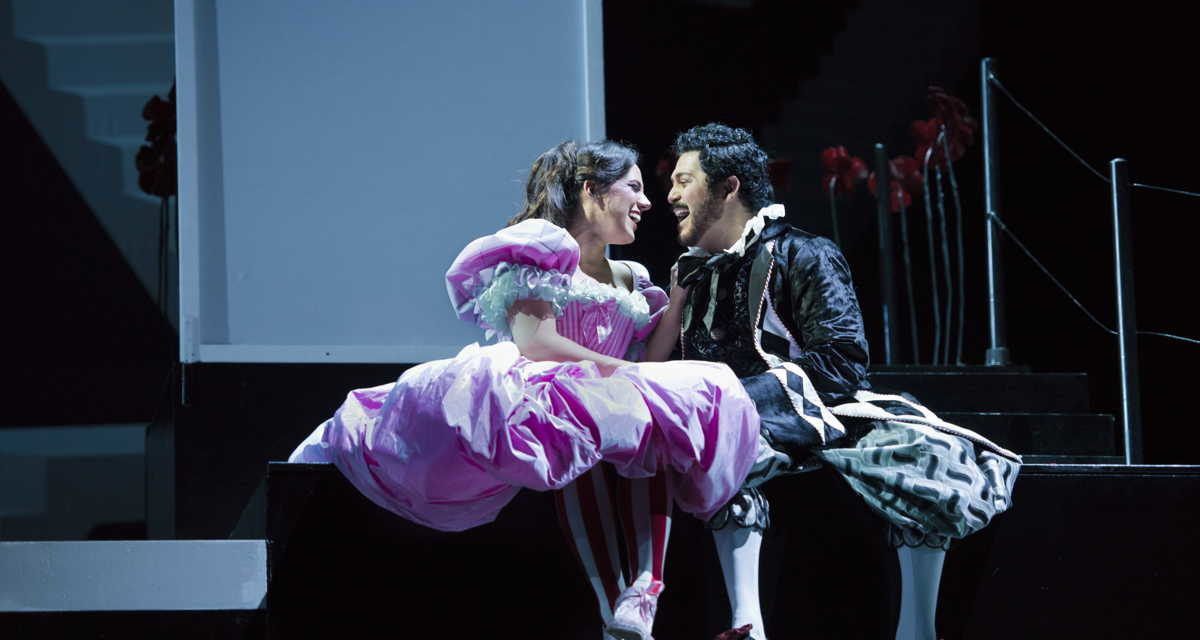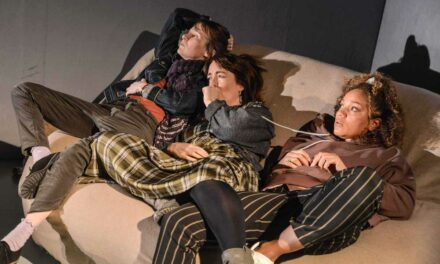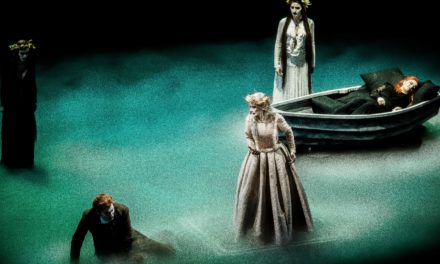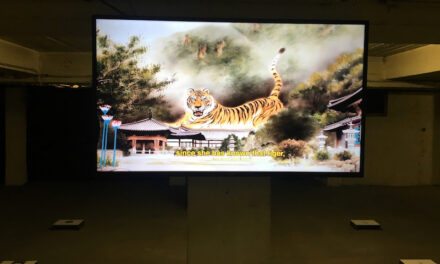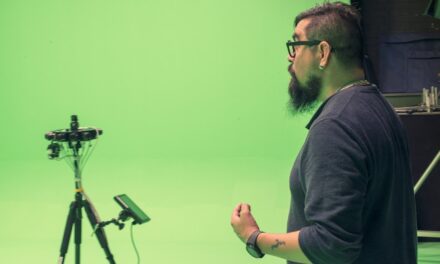Gioachino Rossini’s most famous opera, The Barber Of Seville, opened Friday night at the Cutler Majestic as Boston Lyric Opera’s season opener. The piece is the composer’s most frequently produced for good reason. The antics of the Pierre Beaumarchais play make it Rossini’s most entertaining. Despite some vocal miscasting, Rosetta Cucchi directed a high energy evening sparkling with laughs in the buffo tradition, and David Angus ably led the BLO cast and orchestra in some of the most well-known music in the canon.
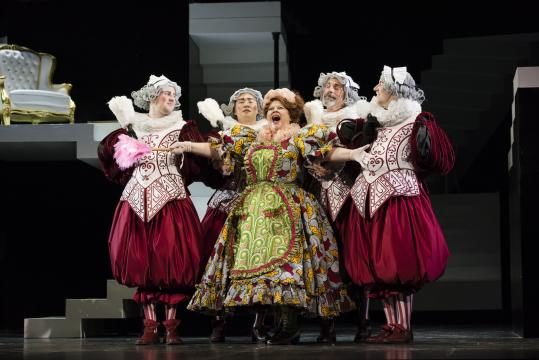
Michelle Trainor, as Berta, the governess in Bartolo’s home, finishes her lament on loneliness with a smile, surrounded by in Boston Lyric Opera’s new production of The Barber Of Seville, directed by Rosetta Cucchi. Photo: Liza Voll Photography
Contrasted with last year’s season opener of Tosca, this is not grand opera in the serious tradition. Librettist Cesare Sterbini even takes jabs at the more serious operas by Rossini’s contemporaries. Count Almaviva and Rosina fall in love and plot to steal her away from her guardian, Dr. Bartolo, while enlisting the help of his barber and factotum, Figaro. There were many delightful directorial decisions for the singing actors. They had great chemistry and repartee throughout the recitative. Don Basilio making surprise vocal re-appearances from a tiny window in the set proved to be hilarious even on repeat. The use of chorus members as backup singers and dancers throughout characters’ arias proved effective. The most liberties took place in the scene at the height of the farce when Count Almaviva poses as “Don Alonso,” the music teacher and pupil of Don Basilio. Almaviva mimes a ridiculous piano in their “music lesson,” Don Bartolo is featured listening to headphones and scatting jazz in the breaks in between, and segments of Lady Gaga-inspired warm-ups were thrown in, (Bad Romance, to be exact). None of this was lost on the appreciative audience.
Rossini makes extreme vocal demands with fast-moving acrobatics and the majority of cast members were well-suited to this voice type. As Rosina, mezzo-soprano Daniela Mack excelled in all aspects. Her tone was warm and fluid throughout. The punchlines of Una Voce Poco Fa were not only well-timed, but her coloratura was exactingly executed and the low notes, in particular, were robust without being weighed down by too much heft. Unfortunately, for both leading men in this production, while the recitative was excellently prepared and playful when faced with higher sections of singing, neither relied on their bodies, seemingly working from the neck up. A tall and physically agile Figaro and an inspired actor and comedian, Matthew Worth struggled in his opening aria, Largo Al Factotum, arguably the most famous aria in all of opera. It was opening night and there were some slight pits of not matching tempo between orchestra and Figaro, but those moments aside, much of the higher extension of his voice sounded strained.
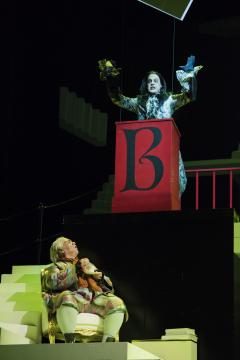
(l.r.) Steven Condy, as Bartolo, listens to David Crawford as Basilio, who concocts a scheme to discredit one of Rosina’s other suitors in Boston Lyric Opera’s new production of The Barber Of Seville, directed by Rosetta Cucchi.
Photo: Liza Voll Photography
Jesus Garcia, who was the vocal standout in the company’s production of La Bohème years ago, faltered a bit in this role. Usually intended for the highest and most agile of tenor voices, Rossini’s Count Almaviva was a bit of a stretch for someone so well suited to verismo singing. In his first aria, Ecco Ridente In Cielo, he struggled to keep the voice even and was even shaking physically in higher portions. His second aria offered more opportunity for him to show his skill at creating line and beautiful vocal colors, his obvious strong suit. Michelle Trainor, as Berta, was a delight to watch and was placed vocally in more of her sweet spot than in previous roles with the company. Able to show off more of her impressively large high notes at the end of her aria than she has in past productions, she also stole at least one scene with an extended gag involving snuff and the cleanup from a series of sneezes. David Crawford as a wan, creaky Don Basilio made the most of his comedic moments, and his aria, La Calunnia, was a well-sung highlight, though it was done from a podium and was one of the more stationary stagings. Steven Condy was excellent as the blustering old Dr. Bartolo, using his voice in many character iterations to great comedic effect. Vincent Turregano, as Fiorello, lacks some core and roundness to the voice but is well-suited to the high-energy acting of Rossini.
The set was inventive for the piece–largely black and white with many rotating staircases. A large painted backdrop of more staircases at different angles completed an Escher effect. But, in the tradition of recent BLO productions, the largely empty and open feeling of the stage, in general, left one puzzling over whether they couldn’t hide budget constraints. The set also seemed extremely unwieldy and quite frankly, perilous, looking enough to be nerve-racking to watch. Singers were set on high balconies with lots of movement and no railings. The tenor tripped over the corner of a set of stairs at least twice and a particularly frightening moment when Rosina was just stage right of a piano and next to a large drop had this viewer very distracted. Elements of exaggerated commedia dell’arte costumes featured winks at court jesters, brightly colored striped stockings and comically large skirts and pants. The all-male chorus costumes in a mostly black and white color scheme and cartoonish wigs somehow resembled both Alice In Wonderland playing cards and Oompa Loompas. They highlighted their facial language beautifully. Though not really a showcase for the chorus, they were excellent as usual under new chorus master, Brett Hodgdon. He also did an excellent job on fortepiano, even throwing in the opening of Schubert’s Gretchen Am Spinnrade (Gretchen At The Spinning Wheel), during the opening recitativo of Act II while Bartolo and Berta are pictured working with yarn.
Overall, the comedic risks paid off in a well-received, often uproarious evening at the Culter.
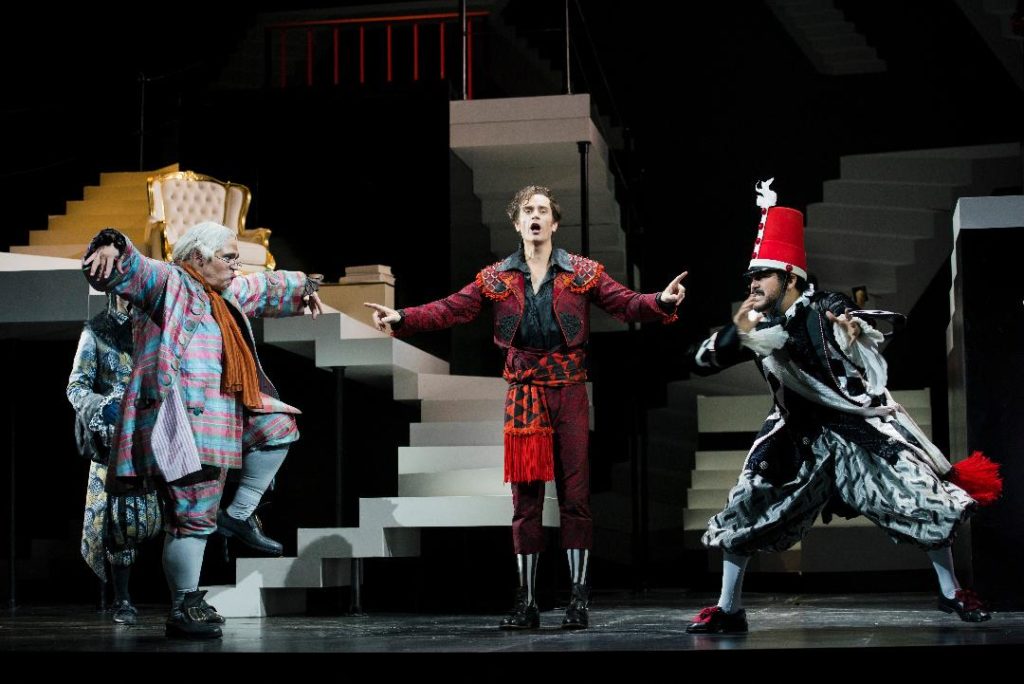
(l.r.) Steven Condy as Bartolo, Matthew Worth as Figaro, and Jesus Gonzalez as Almavivain Boston Lyric Opera’s new production of The Barber Of Seville, directed by Rosetta Cucchi. Photo: Liza Voll Photography
This post was written by the author in their personal capacity.The opinions expressed in this article are the author’s own and do not reflect the view of The Theatre Times, their staff or collaborators.
This post was written by Katrina Holden-Buckley.
The views expressed here belong to the author and do not necessarily reflect our views and opinions.

